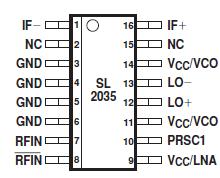SL2035: Features: · Single Chip Broadband Solution· Wide Dynamic Range RF Input· Low Phase Noise Balanced Internal Local Oscillator· High Frequency Range: 1 to 1·3 GHz· ESD Protection 2kV min., MIL-STD-883B...
floor Price/Ceiling Price
- Part Number:
- SL2035
- Supply Ability:
- 5000
Price Break
- Qty
- 1~5000
- Unit Price
- Negotiable
- Processing time
- 15 Days
SeekIC Buyer Protection PLUS - newly updated for 2013!
- Escrow Protection.
- Guaranteed refunds.
- Secure payments.
- Learn more >>
Month Sales
268 Transactions
Payment Methods
All payment methods are secure and covered by SeekIC Buyer Protection PLUS.

 SL2035 Data Sheet
SL2035 Data Sheet







